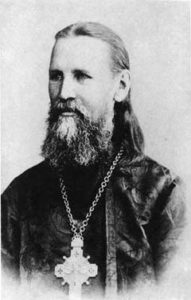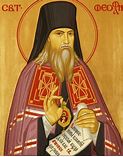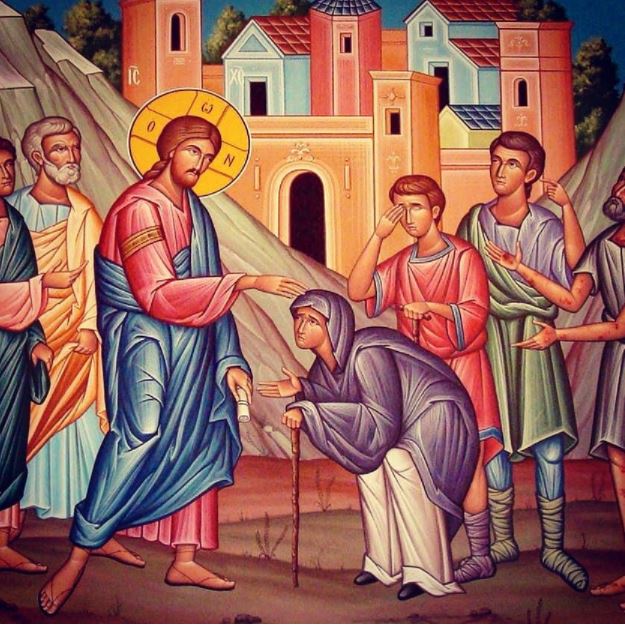SSCORRE!
Saint Sophia Cathedral
Online Resources for our Religious Edification

Topic of the Week –
Virtue in Sickness
On the Purpose of Illness and Its Potential to Protect Us – “If we come to understand the nature of fallen man, we shall be able to learn about ourselves; and we shall be able to know God and worship Him as Creator…” [Our “golden mouth” Saint reminds us that it is our lack of faith in God that causes harm to our souls and bodies. Therefore,] “ we should not dread any human ill – neither poverty, nor disease, nor insult, nor malicious treatment, nor humiliation, nor death – except sin alone. For these ills are only words; they have no reality for those who are living for the Kingdom of the heavens. The only real calamity in this life is offending God. If we have this basic understanding of the purpose of life, then the spiritual meaning of bodily infirmity can be open to us.” – Saint John ChrysostomExcerpted from The Holy Fathers On Illness – The Purpose of Illness, Part 2“Geronda, is it a good thing to pray for our health?”
“It is better when we seek God’s help to liberate us from our passions. In other words, we should first seek the Kingdom of God. If we beseech God to heal us, we are consuming our heavenly property. But when we are unable to endure the pains of our illness, then we can ask God to heal us, and he will act accordingly.” (St. Paisios)Excerpted from Spiritual Counsels Vol. 4 – Family Life, Part V The Trials in Our Life, Chapter 2, Illness p247“…I was given this topic through Alex, but I was told it came from Fr. Noah. He gave me this topic, I believe, when he heard I was smitten, struck down [by the virus] and so he knew that if I’ve got a sickness I’d better start thinking hard about virtue… so he directed my thoughts to contemplating virtue in sickness…”
- “When the people of Pharasa got sick, they would not run for a cure immediately to Hadjephentis. [the spiritual elder of the community.] They first endured the pain as much as they could, with philotimo and patience, for they considered suffering to be a blessing. They would reason “Let me torment my soul a little for the sake of Christ, since He suffered greatly to save me.” They would go to Hadjephentis to heal them only when they saw their work falling behind and their families suffering.” Spiritual Counsels Vol. 4 – Family Life (Elder Paisios) – Part V The Trials in Our Life, Chapter 2: Illness, p230
… The question still comes to my mind. Why would they do that? What kind of reasoning would lead a person to draw that sort of conclusion? I think that in our secular age, most people would argue that the kind of reasoning that leads you to that conclusion is either a mental illness or on the brink of a mental illness. Consider what St. Paisios says. He brings in what he calls a spiritual logic:
- “When the body is tested, then the soul is sanctified. With an illness, we experience pain in the body, our earthen home, but this is how our soul, the landlord, rejoices eternally in the heavenly palace prepared for us by Christ. With this spiritual logic, which sounds rather irrational for worldly people, I too, rejoice in… my physical wounds.” Spiritual Counsels Vol. 4 – Family Life, Part V The Trials in Our Life, Chapter 2, Illness p226
It might be worth it to mention here that the man who said this [Saint Paisios], said it while he was in the process of undergoing radiation and chemotherapy. He had cancer. He had suffered. And yet he rejoices in his physical wounds.
Well, what I want to draw from this line is ‘spiritual logic’… it’s so irrational for worldly people. It’s not worldly logic. It’s spiritual logic. Does it have something to offer us?…”
Listen to the entire presentation Andrew Kern – Virtue in Sickness
Adult/Family:
“You see, for example, a youth in his prime, puffed up because of his strength and behaving arrogantly, forgetting about God and his soul — then suddenly he lies prostrate on a bed of pain. Then, as a most experienced and skillful doctor, pain begins its surgery. First, it operates on the heart by removing its hardness little by little, and thus it softens the soul. He who was formerly hard of heart becomes soft and calm in his feelings. He commiserates with his fellow patients, and he who was formerly unsympathetic speaks with sympathy. And once his heart has been prepared through these and various other feelings brought about by the instructive rod of pain, then the ears of his previously deaf soul open, and he accepts, retains, and attentively listens to the word of truth, the gospel of salvation.
Then he who was formerly indifferent to God and to his soul becomes zealous in reading various religious books and periodicals. He begins to recall his sinfulness with genuine contrition and feeling. Thus he learns to pray with compunction and soon becomes an eloquent preacher of the benefactions of the excellent doctor, pain, proclaiming that it alone cures the illness of being far from God.
Pain cures not only the person who is far from God; it also heals souls that are healthy, but partially ill with a “sickness not unto death,” such as occasional indifference, criticism, self-love, cowardice, doubts, and so on. Pain exercises its activity even in the saints so that through their patience their glory may be increased. However, the saints often suffer also to give an example to others, as happened with long-suffering Job, St. Syncletiki, and so many other saints….”
Excerpted from Counsels from the Holy Mountain pp40-41
Listen also to the presentation Virtue in Sickness. Read Spiritual Counsels Vol. 4 – Family Life (Elder Paisios)
Preschool:
Once a hermit fell ill. Because he had no one to look after him, he got up and ate whatever he found in his cell. Though this happened for several days, no one came to visit him. Even after a month no one had come. Then the Lord sent an angel to take care of him. After the angel had cared for him for a week, the monks remembered him and said to each other, ‘Let us go and see if the hermit is ill.’ They went to his cell: and the moment they knocked on the door, the angel left him. The hermit inside shouted, ‘Go away, my brothers.’ But they lifted the door off its hinges and went in, and asked him why he shouted. He said, ‘For a month I was ill and no one visited me. Now for a week an angel of the Lord has taken care of me, but he went away the moment you arrived.’ With these words, he died peacefully. The brothers wondered, and glorified God, saying: ‘The Lord does not forsake them who trust in him’ (Ps. 9:10).
From the Sayings of the Desert Fathers
Elementary:
Syncletica also said, ‘If you are troubled by illness, do not be miserable, even if you are so ill that you cannot stand to pray or use your voice to say psalms. We need these tribulations to destroy the desires of our body; they serve the same purpose as fasting and austerity. If your senses are dulled by illness, you do not need to fast. In the same way that a powerful medicine cures an illness, so illness itself is a medicine to cure passion. A great deal is gained spiritually by bearing illness quietly and giving thanks to God. If we go blind, let us not be upset. We have lost one means to excellence, yet we can contemplate the glory of God with the inward eyes of the soul. If we go deaf let us remember that we shall no longer hear a lot of silly talk. If suffering has weakened the strength of your hands, you still have inner strength against the enemy’s attacks. If the whole body is afflicted by disease, your spiritual health is still increasing.’
From the Sayings of the Desert Fathers
Middle School:
“If we ask something from God without making any sacrifice, it has no value… If I make some sacrifice, Christ will recognize my love and then He will fulfill my request – if indeed this is for the spiritual good of the other.”
Quote from Saint Paisios taken from Spiritual Counsels Vol. 4 – Family Life , Part V – The Trials in Our Life, Chapter Two: Illness, p244
“It’s that idea that I’m making a sacrifice, we’re giving up something ourselves, is added to, that makes our prayer maybe authentic, maybe it makes it more genuine. But whatever it does, I don’t know, but Christ will recognize my love when this happens.
Let me just say two things about this… I’m a convert to Orthodoxy and this kind of thinking is not welcome among Protestants. [In Protestantism] you don’t add to what Christ has done; Christ has done everything.[As Saint Paisios says] If I make some sacrifice Christ will recognize my love. Or even, if we ask something from God without making any sacrifice, it has no value. I come into the spiritual realm not valuing this thought by my own tradition; I had to really absorb this [idea] that if I make some sacrifice Christ will recognize my love.The second thing I want to say from my personal experience is when I read this a week and a half ago, around that time, my brother’s wife was suffering from cancer and had to have surgery to have half her leg amputated. And from that time up until today I’ve been getting updates from my brother telling me she is in intense pain and has not been able to sleep at night and all that sort of thing. So, I stand in front of the icon and say “Save O Lord my sister Jill.” I’m not going to complain about that – I should do that.But the Lord blessed me last Sunday with a really nasty headache – nasty for me… usually what I do is cry and run to the cupboard and grab Tylenol and drown it and feel better. But this time I had just read this and I thought ‘I have to do that’ and so it was very interesting. I complain a lot by disposition. But it was very interesting because I resolved not to take any medication for it but I knew I couldn’t complain about it – that’s not offering it to God. So I said ‘Save O Lord my sister-in-law Jill’ and whenever my headache got worse I would say that prayer again. And the truth is, my experience of that headache was unlike any other headache I have had in my entire life. Now, I’m talking to you from a kindergarten level. But I can testify to you that one time the spiritual benefit to me was far beyond the pain of the headache and I give glory to God for that. It was a great blessing.“Listen to the entire presentation Virtue in SicknessHigh School:
“Health is a great gift, but the good provided by illness cannot be had through health.” Spiritual Counsels Vol. 4 – Family Life, Part V – The Trials in Our Life, Chapter Two: Illness, p224
And I think every one of you has had experiences that would tell you the truth of this. No, we don’t want to go beyond our capacity, but I think all of us would acknowledge that the good that illness provides is a good that obviously perhaps when you say it, health couldn’t provide.
There are things that illness provides us with that only illness can provide us with. Maybe it’s like the CS Lewis point that when God wants to get our attention he uses the megaphone of pain.
In fact, he [Saint Paisios] goes on to say that a person who is completely healthy is not really well. Who thinks like this? This is a spiritual reasoning.
“A person who is completely healthy… is not really well. It would be better if he had some health problems. Speaking for myself, I benefitted more from my illness than I had benefitted from all the ascetic struggle I had carried out until then. This is why I say that if a person has no obligations, he should prefer an illness rather than total health.” Spiritual Counsels Vol. 4 – Family Life, Part V – The Trials in Our Life, Chapter Two: Illness, p226
At some point we want to think about how do we prepare for sickness. Right there we have an indication.
“A person who is completely healthy… is not really well. It would be better if he had some health problem.” Do you think perhaps this [computer issues during the presentation] is happening to illustrate the point? Right… it would be working so much more smoothly if everything just worked better, and then everything would be so convenient. But what good would it do you beyond just listening to the talk? Right – this [computer connectivity problems] is actually demanding something of us all.
“Speaking for myself I benefitted more from my illness than I had benefitted from all the ascetic struggle I had carried out until then. This is why I say if a person has no obligations, he should prefer an illness rather than total health.” That’s not normal reasoning. Agreed? How many of you have written this in your journal – ‘I wish I was ill instead of healthy? Maybe there is something really sensible about this. What would lead him to think that way? Well he goes on to say this, he starts to talk about benefits:
“The more one suffers trials and tribulations through illness, the more he is purified and sanctified, as long as he is patient in his illness and accepts it with joy.” Spiritual Counsels Vol. 4 – Family Life, Part V – The Trials in Our Life, Chapter Two: Illness, p224
… It does come down to that question of just how much do we want to be purified and just how much do we want to be sanctified and that in turn, turns to the question of just how much do we want to see God? Because we know the verse, we know the beatitude, ‘Blessed are the pure in heart for they shall see God.”
And you can draw that easy analogy to the athlete. Good grief, the suffering athletes go through. I swim a few times a week when I’m healthy and it’s just a nice casual lazy swim that I do more or less to keep fit and I don’t even like that amount of pain. And then I think of when I was on the high school swim team or when I look at the Olympians. My swim team captain when he did the butterfly, his shoulders didn’t work right so he had to do a double movement and his shoulders nearly slipped out of joint almost every time. When he was done it was agony for him. And yet he made it to state. Why? Because he cared so much about that. He wanted that so badly. That in a certain sense his desires were not ultimately spiritually, but in a certain sense in relation to swimming his desires were purified and set apart, if not sanctified.
How much do we want that? That’s a part of the equation. And I think behind that is the question of just how good a thing is it actually? Just how good a thing is it to see God? Now, put like that we’re going to say ‘it’s a great thing’ but how good a thing, how great a thing?…
Listen to the entire presentation Virtue in Sickness
A Message from Maria Spanos
I am passionate about our Orthodox Christian faith and seek to help others learn as much as they can about it. My purpose here is to share online resources that help strengthen our relationship with Christ and bind us closer to His Church. I believe they are invaluable in learning about our precious Orthodox Tradition, and are a great aid for teaching family members, friends and others about Orthodoxy. ~Maria
Two of my favorite quotes:
 “A true Christian behaves in this life so that it may be a preparation for the future one and not only a life here below. In his actions, he does not think what will be said of him here but of what will be said there in heaven; he represents to himself that he is always in the presence of God, of the angels and all the saints, and remembers that someday they will bear witness of his thoughts, words, and deeds.” — Saint John of Kronstadt
“A true Christian behaves in this life so that it may be a preparation for the future one and not only a life here below. In his actions, he does not think what will be said of him here but of what will be said there in heaven; he represents to himself that he is always in the presence of God, of the angels and all the saints, and remembers that someday they will bear witness of his thoughts, words, and deeds.” — Saint John of Kronstadt
__________________________________________________________

“Of all the holy works, the education of children is the most holy.”
— St. Theophan the Recluse







